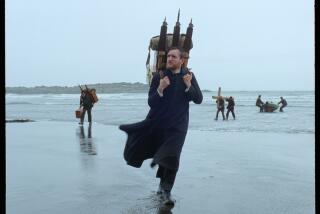Digging for the Roots of ‘Willow’s’ Mixed Reviews
- Share via
Fear, loathing, suspicion and mistrust cling to critics like burrs.
As often as not, these rank emotions arise in simple disagreement. “You liked; I disliked. Therefore you are a blithering idiot.” Or, “I hated; you admired. Therefore you are a fool of uncertain and dubious ancestry.”
Critics are made to be disagreed with, so this is no grave matter. It is always reassuring to keep in mind that what the critic is offering is only informed opinion, even if it is frequently disguised as God’s absolute truth.
The real fun begins when the reviews of several critics on one piece of work can be examined, and the wild divergences noted in the findings of men and women of roughly equal intelligence. It is not always clear that they have been responding to the same item, so sharp and hostile are the differences.
The present case in point is George Lucas’ “Willow” (to be followed shortly by the reactions to Sylvester Stallone’s “Rambo III”). The reactions to “Willow,” summarized in last Sunday’s Calendar, have ranged from a 9 1/2 on Gary Franklin’s scale of approval to the kind of notices you might give bubonic plague.
The split is so wide and the negative notices so actively hostile that you have to ask why, and to wonder whether the nay-sayers are fairly reporting the film to the family audience at which it is aimed. An informal exit poll last weekend, reported in Monday’s paper, indicated that the parents and children attending had had a fine time.
It’s hard not to suspect that, whatever the merits or demerits of “Willow,” the great tradition that success cannot be allowed to go unpunished has been upheld. The tradition is not unique to Hollywood or film critics, but it exists and it weighs most strongly against the achievers to whom an appeasing humility does not come easily, or at all (Kubrick, Brando, Hoffman, Beatty, Stallone, Fonda, Redgrave . . . to start a hurried list). It’s as well Greta Garbo quit when she did; the next time out she might have been found to be overrated.
My truth about “Willow” (which is not his or hers or theirs or the Almighty’s) is that it is longer than it ought to be and that it is worryingly slow at the start. Not all of its inventions are successful, and the existence of two clownish miniature Frenchmen, while technologically dazzling, is simply not very interesting. They are a ploy that doesn’t come off.
“Willow” isn’t “Star Wars” or, to quote another film maker’s work, “E.T.” It may well be a long time before we see the equivalent of either again. But “Willow” is good-hearted and sweet-natured, conceptually about as far from the rutting cynicism of many present films as it’s possible to get. And the parent-child audiences to whom the film is addressed are likely to appreciate the point of view.
If the two tiny men don’t work, there are some magical transformations (a wand-waving and an incantation that keeps going a bit wrong) that are extraordinary special effects. After its slow start, the film picks up momentum like a train and reaches a very satisfying finish.
It remains to be seen whether audiences are turned off by little people in principal roles, as has been predicted. Warwick Davis as Willow is an attractive and sympathetic character, and “Willow” could be the exception that confounds the rule.
The principal philosophical objection to “Willow” has been that the mythic elements Lucas is fond of--good versus evil, monsters and wicked queens, rascals who see the light--have been done to death. “Not ‘Once upon a time’ again!” has been a recurring cry.
But this confuses the material and the handling. The myths have served us well for thousands of years; only the weapons have changed, from rocks to spears to six-guns to lasers (and potentially back to rocks again if all goes sour).
“Willow,” in fact, has the appeal of the fairy tale and the storybook adventure. It may well be that the mythic elements have been more perfectly employed elsewhere, and by Lucas himself, but I doubt that the sense of wonder and the delights of magic have left us, no matter what anybody says.
More to Read
Only good movies
Get the Indie Focus newsletter, Mark Olsen's weekly guide to the world of cinema.
You may occasionally receive promotional content from the Los Angeles Times.









